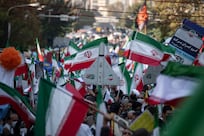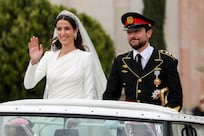New Order like a challenge. Just a few years ago, the legendary Manchester band seemed to be a spent force, laid low by health problems and legal battles.
But these elder statesmen of post-punk dance-pop scored a critical and commercial triumph in 2015 with their comeback album Music Complete, a return to their heavily electronic signature sound.
They are now basking in a glorious third-act resurgence, performing at rapturously received arena shows around the world.
The band's perennially boyish singer, 61-year-old Bernard Sumner, is still buzzing from their gig at the Dubai Duty Free Tennis Stadium in April, New Order's first in the region.
“I’ve been to Dubai before,” he says, “in the desert, on holiday, for New Year’s Eve a few years ago – but this was the first time we have played there.”
Sumner bristles at westerners who criticise the UAE while overlooking the fact it is a young country.
“The thing you’ve got to remember about Dubai is the whole place is in the process of transition,” he says. “There may be things that happen there that we don’t like, I understand that, but you’ve got to give it a chance.
“It took the United Kingdom thousands of years to establish democracy but Dubai has only really been in existence since about 1980.”
As the Dubai audience witnessed, New Order’s current stage production is a majestic audio-visual spectacle of wall-to-wall anthems, including an emotionally charged selection from their Joy Division days.
Once notorious for their chaotic, hit-and-miss live shows, with this latest chapter the band have reached new heights of slick professionalism. The set from the tour was recorded, at Brixton Academy in London, for a live album, NOMC15, which was released this month.
Sumner admits he used to hate touring, but says he enjoys it much more now that the chemistry in the band has changed.
“Yeah, I didn’t like it for a number of reasons,” he says. “One was the hedonism – I used to make myself incredibly ill. That my own fault, no one else.
"And the other was... how can I say this tactfully? The vibe in the band wasn’t so good. But now the vibe is healthier, much less oppressive.”
This is a thinly veiled reference to New Order founding member and former bass guitarist Peter Hook, who Sumner now refuses to even mention by name.
The pair have had a volatile love-hate relationship since their teenage schooldays in Salford, Manchester’s sister city, where they founded Joy Division together. Hook quit New Order in 2007, unilaterally declaring the band’s demise. The estranged musical partners have been fighting over the band name and financial royalties ever since, with an acrimonious court case in the pipeline.
It feels like a sad end to a complicated friendship.
“It’s sad if you are really close friends, yeah, but we weren’t really,” Sumner shrugs. “I think we got to the stage where we were drifting apart and then the band happened, so that glued us together. But it just got worse and worse over the years. We are just very different people.”
Manchester remains a vital part of New Order’s DNA. The band members still live in the city and later this summer they will play five special hometown concerts, accompanied by a 12-piece synthesiser orchestra, as part of the Manchester International Festival. It is an oddly nostalgic decision by a group who have always been future-facing modernists – but also a highly popular one. All the shows sold out quickly.
"I'm not nostalgic whatsoever," Sumner says. "Don't look back – it's always been about the future. Without that attitude I wouldn't be here today and we wouldn't have come up with tunes such as Blue Monday or Bizarre Love Triangle or Temptation."
It now feels like New Order have finally outlived their own legend. After a decade in which a flood of reverential books and films helped reinforce the near-mythical significance of Joy Division and New Order, the flesh-and-blood creators of all that glorious music are back to write the next chapter.
Sumner might not do nostalgia, but he admits his past sometimes weighs heavily.
“When we started New Order it was both a burden and a blessing,” says Sumner. “People were interested in us because, obviously, we were Joy Division but it was a burden in that we couldn’t be Joy Division. We had to reinvent ourselves but we weren’t very good at reinventing ourselves – we’re not rock chameleons like David Bowie or Madonna. We didn’t have a clue really.”
• NOMC15 is out now
artslife@thenational.ae





